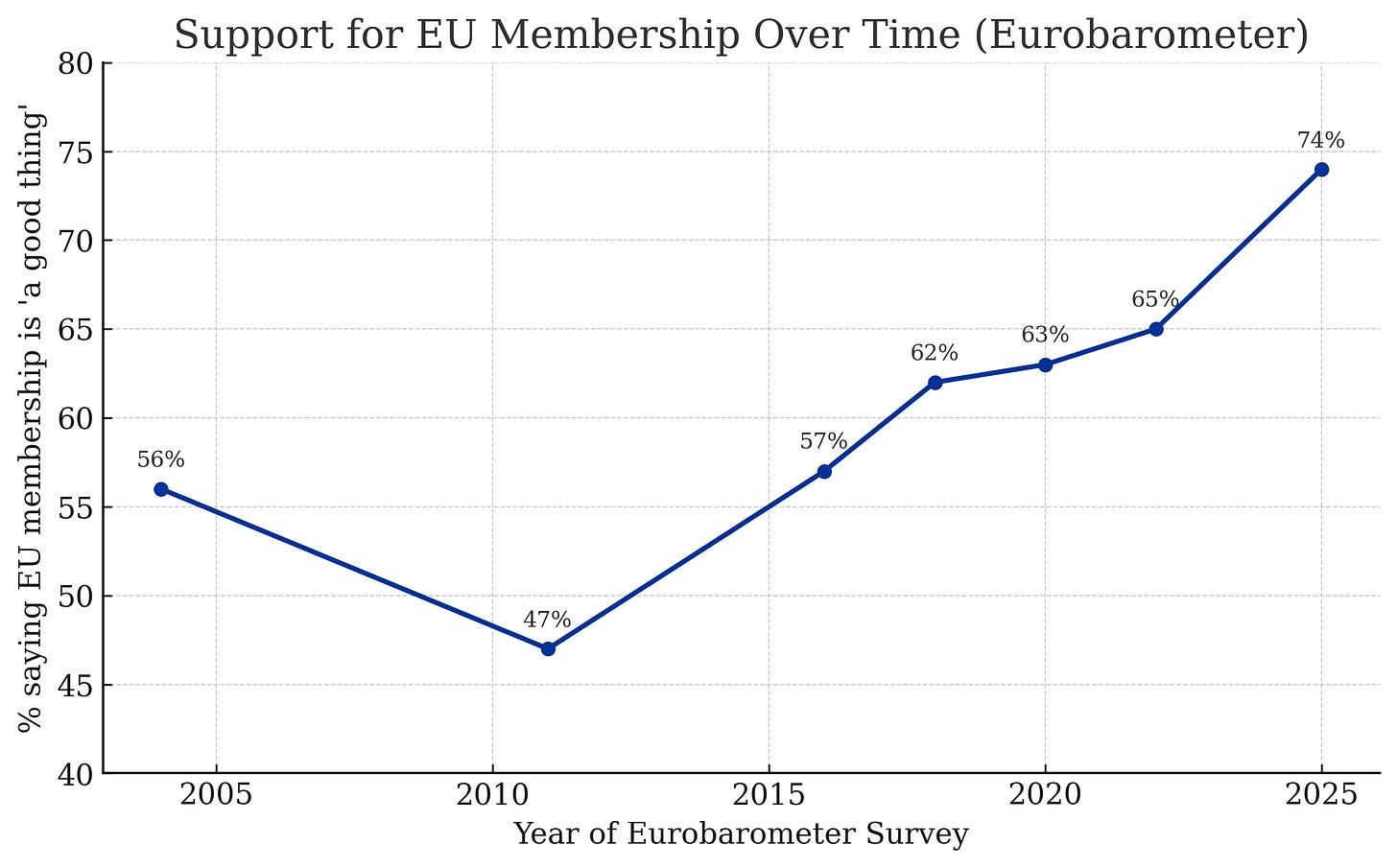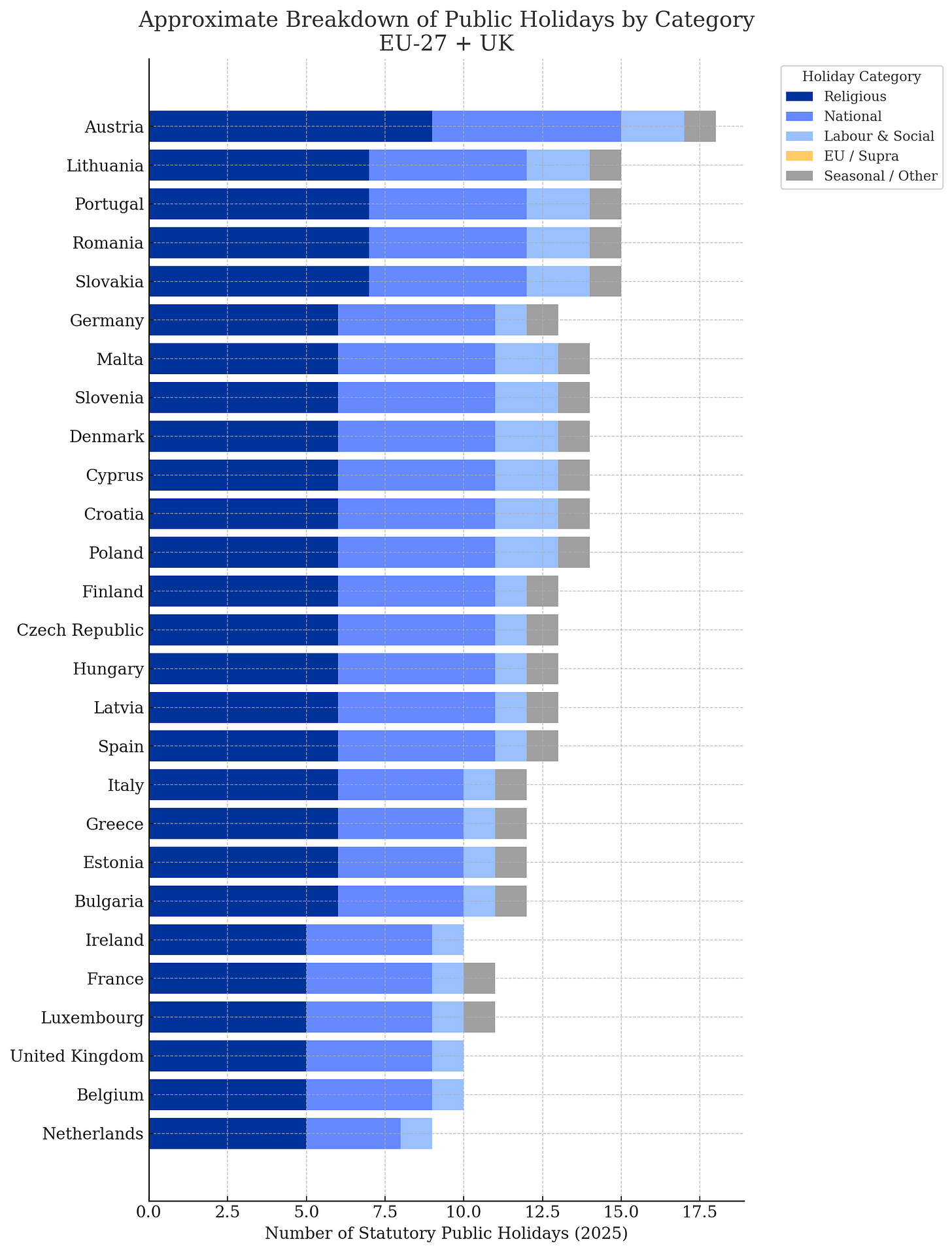Happy Europe day! - and why it should be a celebrated public holiday
It's 9 May - exactly 75 years since the Robert Schuman declaration. Here are some reasons and some data why it should be a public holiday in all EU member states.
Europe Day turns 75 this year, and the EU is leaning hard into the birthday slogan “Unity & Co-operation” - which is more relevant than ever before. Today we celebrate that on 9 May 1950, French foreign-minister Robert Schuman read a 3-minute declaration proposing that Europe pool coal and steel so “any war between France and Germany becomes not merely unthinkable, but materially impossible.” This press-conference birthed the European Coal and Steel Community which snowballed into today’s 27-nation Union, but why should we celebrate it and have an annual excuse to wrap buildings in yellow stars and take a day off work?
Let’s celebrate peace and unity
Personally, I think that we could use a yearly reminder that the original European project has been a success with 0 interstate wars between 1950 making it the longest European peace in history. Despite growing polarization, the support for EU membership has been in the rise - the highest level since 1983 was reached for the question of support of EU membership.
But why should it be a public holiday?
In Europe a holiday becomes “public” only when national law or government decree obliges closures and guarantees pay/compensation. There is strong heterogeneity between countries in these holidays, let’s break it down per country.
Data is retrieved from the latest 2025 statutory counts. The category shares in the graph are averaged across EU calendars (≈ 46 % Christian‐origin, 36 % national milestones, 11 % labour-movement, 2 % supranational, 5 % seasonal).
Why is Austria topping the list? Mainly because its calendar layers an unusually thick Catholic heritage on top of the standard mix of labour-movement and nation-building dates, and those feast-day rights are held up by a still-binding 1933 Concordat with the Vatican. That concordat means nine Catholic holy days (Epiphany, Corpus Christi, Assumption, All Saints, Immaculate Conception, etc.) are statutory work-free days, so even before you add the secular 1 May Labour Day and the 26 October National Day, Austria already outruns most of its neighbours.
Portugal, Poland and Slovakia come close but also keep many Marian or Pentecostal feasts but still average 14–15 holidays because they lack Epiphany or Corpus Christi or Immaculate Conception - or they offset additions by dropping minor secular days.
Fun fact: until 2019, Good Friday was a day off only for members of four Protestant churches in Austria. The European Court of Justice ruled that carve-out discriminatory; Vienna replaced it with a one-time “personal holiday” model rather than adding yet another nationwide day off.
Who already celebrates Europe day?
Besides all EU institutions (I can personally confirm this for the European Central Bank!), Europe day is also a full public holiday in Luxembourg (since 2019) and Kosovo (since 2011, confirmed in the 2025 calendar). There has been partial recognition in Germany for an official flag day (by federal decree), in Croatia it is listed as a memorial day (with schools flying EU flags, in Lithuania a commemorative day, in Romania it is celebrated alongside Independence day and additionally, Ukraine made it a public holiday in 2023 to underline its European identity.
Why widen the circle?
Symbolic parity - Labour Day (1 May) began as a workers’ movement demand and is now a day off in almost every EU country; Europe Day could follow the same path for civic unity.
Educational dividend - A school-free day paired with city-centre festivals lets citizens engage with EU programmes (Erasmus stands, citizen consultations, etc.).
Tourism uplift - Long-weekend travel spikes in Luxembourg since 2019 show a 3 % rise in domestic overnight stays every May
Policy precedent - The UK added May Day only in 1978; Austria’s National Day (26 Oct.) started in 1965. Calendars evolve with political milestones.
So, if tiny Luxembourg can give its workers a May “Schuman break,” why not Paris, Warsaw or Copenhagen? Turning Europe Day into a continent-wide public holiday would give citizens a tangible stake in the EU story - reinforcing the peace and prosperity at relatively low economic cost (about 0.3 % of annual GDP per extra day, a figure most EU economies already absorb for other observances). This 75th anniversary is the perfect launchpad for mayors or parliaments to table that extra day - reminding 450 million Europeans that unity still tastes better than division.
I might have to add that having spent some time at an EU institution - complete with cheesy pro-EU slogans in the hallways and full appreciation of Europe day - might have slightly biased my opinions;)






